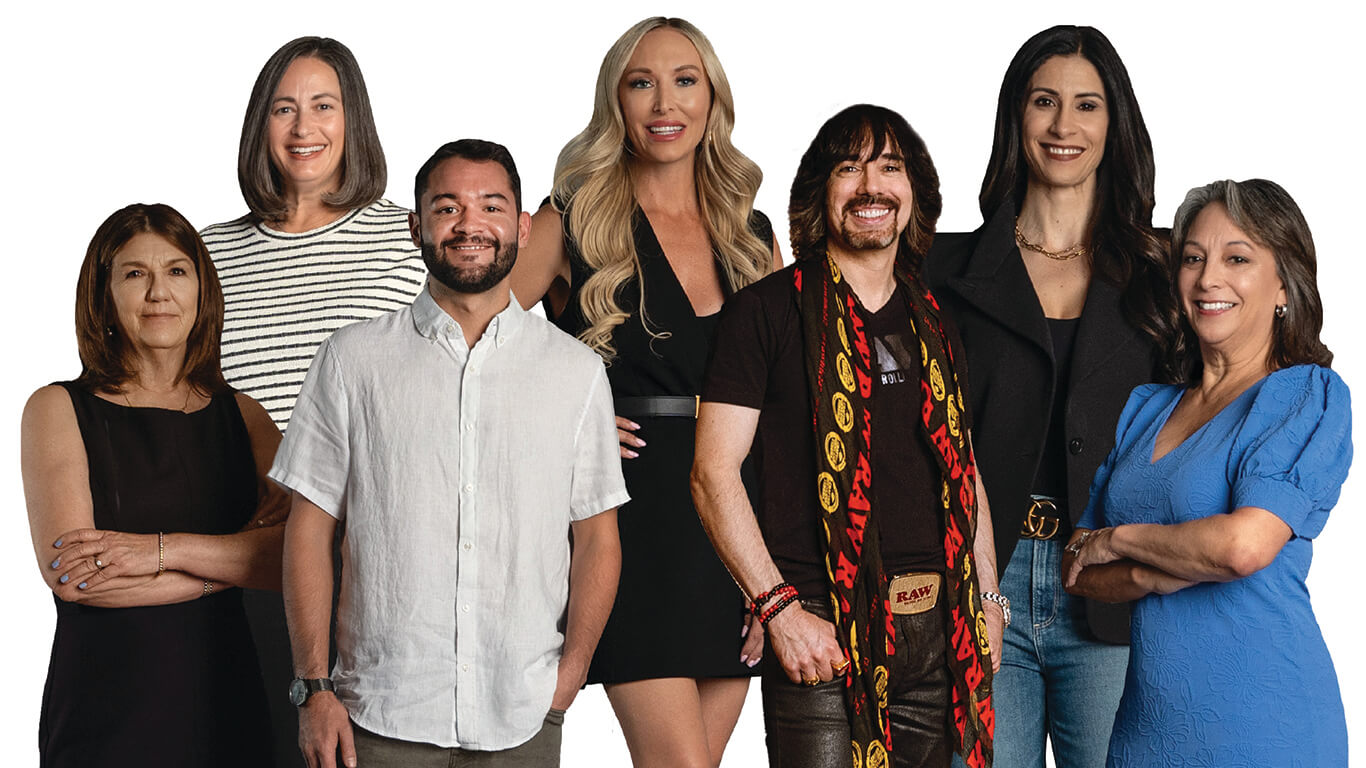The Arizona cannabis industry is the embodiment of the adage, “Change is the only constant in life.” From the years-long election and legislative battles that culminated in legalization in 2020 to the policy and business operations challenges facing the young but quickly maturing industry today, the top Arizona cannabis leaders are a determined yet nimble group of individuals on the leading business edge with backgrounds, experiences and lessons learned as varied as the state they serve. But to a person, they have their eyes on a singular goal: a commitment to providing consumers with safe, regulated, quality cannabis products.
And how do you achieve that?
“The team, the product, and the cash,” says Kirk Schmitz, vice president of operations at Grow Sciences, a craft cannabis grower, developer and supplier headquartered in Phoenix.
“A strong team builds the business, a quality product sustains it, and disciplined cash management allows it to thrive,” says Schmitz, who left biotech to join cannabis in 2014. “In an industry where margins, regulations, and market dynamics shift constantly, a strong foundation is critical.”
Susan Hwang, founder and CEO of BEST Dispensary and YUMA Dispensary, calls it “the power of adaptability.”
“The industry is constantly evolving—whether it’s regulations, market trends, or consumer preferences—so being able to pivot while maintaining integrity and quality is crucial,” she says. “I’ve also learned that education is key, both for consumers and within the business itself. Creating a knowledgeable team and an informed customer base has been essential in building trust and long-term success. Most importantly, I’ve learned that resilience and strategic thinking are what set apart businesses that thrive from those that merely survive.”
DEEPER DIVE: Ranking Arizona: Top 10 cannabis law firms for 2025
INDUSTRY INSIGHTS: Want more news like this? Get our free newsletter here

Influential leaders in Arizona cannabis for 2025
Here are some of the most influential executives in Arizona cannabis for 2025:
Laura Bianchi, Bianchi & Brandt
Greta Brandt, The Flower Shop Dispensaries
Justin Brandt, Bianchi & Brandt
Demitri Downing, Marijuana Industry Trade Association (MITA)
Sara Gullickson, The Cannabis Business Advisors
Ryan Hermansky, Noble Herb Dispensary and Pure Edibles
Lori Hicks, Arizona Natural Concepts (ANC) Dispensary
Susan Hwang, Best Dispensary
Josh Kesselman, RAW Rolling Papers & HBI
Raul Molina, Mint Cannabis
Michael O’Brien, Ponderosa Dispensaries
Lilach Power, Mazor Collective and Giving Tree Dispensary
Kim Prince, Proven Media
Sara Presler, Mohave Cannabis Co. and Arizona Dispensaries Association President
Marie Saloum, Green Pharms Dispensaries and Trap Culture Events
Kirk Schmitz, Grow Sciences
A.J. Sullins, High Grade USA
Fife Symington, Copperstate Farms and Sol Flower Dispensaries
George Thimsen, Timeless
Ann Torrez, Arizona Dispensaries Association
Jason Vedadi, Story Cannabis
Brian Warde, The Prime Leaf and Arizona Dispensaries Association Government Affairs

Impact of legalization
Arizona legalized medical marijuana in 2010, with the first sales coming along in 2012. Retail cannabis sales for adult use in Arizona began in January 2021 – a record 10 weeks from Arizona voters approving legalization in the 2020 election to the opening of retail businesses. In brief, Arizona law states that cannabis is available only to those 21 years and older; it is legal to possess up to one ounce of marijuana and to grow up to six plants per household; and it is illegal to smoke marijuana in public.
Arizona’s nascent cannabis industry attracted an array of investors and entrepreneurs from different industries and backgrounds – corporate law, banking, real estate, concessions and hospitality, biosciences and pharmacy, marketing, medical device sales, health and wellness, media.
Jason Vedadi, CEO of Story Cannabis, which operates 19 dispensaries in Arizona, Maryland, Ohio and New Jersey, said getting into cannabis presented “an opportunity to work in an uncharted territory and build a company in an emerging industry from the ground up.”
Ryan Hermansky, CEO and Founder of the Flagstaff-based Noble Herb greenhouse and dispensary and the Pure Edibles cannabis infusion products, said it was “intriguing” to be part of an industry starting completely from scratch.
“When we started the industry in Arizona, no one had any experience, we were all learning every aspect of this business together,” says Hermansky, who joined the industry when medical marijuana became legal in 2012. “It’s incredible to see how the industry has grown in Arizona, and how professional and well developed the marijuana industry has become.”
Getting into the business
Michael O’Brien, CEO of Sonoran Roots, a vertically integrated craft cannabis company in Tempe, said he got into the business, from the legal profession, in 2020 by accident.
“I was helping one of my partners with some legal work, and a few months later we decided to partner up,” he said. “I was inspired by the passion in the industry, the potential for growth, and the opportunity to transition from the legal to the business side of things.”
Since retail legalization in 2021, Arizona’s market quickly expanded but is now showing signs of maturation, the natural business development stage where growth slows, competition intensifies, and businesses move their focus from growth to efficiency, differentiation, and sustainability. Cannabis businesses in other states have gone through similar stages.
Arizona’s cannabis industry achieved sales totaling $1.1 billion in 2024, according to the latest available records. The state joined the billion-dollar club in November 2024, when the industry generated $23.7 million in tax revenue and pushed the state’s all-time marijuana tax revenue total to more than $1 billion. This revenue supports various public policy programs ranging from community colleges to local law enforcement and first responders, the Arizona Highway User Revenue Fund, the Justice Reinvestment Fund and the Attorney General for enforcement costs.
And in October 2024, Arizona expanded its cannabis program by permitting home delivery of recreational marijuana to adults 21 and older – stimulating market growth by broadening public access.
“Adaptability, being nimble, and developing relationships are everything,” says George Thimsen, Partner and Chief Revenue Officer of Timeless, a cannabis brand available in several cannabis-legal states, including Arizona. Thimsen says he was attracted to cannabis “because it’s more than just a business – it’s a cultural shift, a movement, and an opportunity to build something meaningful.”
Building a business
Ann Torrez, Executive Director of the Arizona Dispensaries Association, which works with the industry on business practices and legislative and regulatory representation, agrees.
“I didn’t enter the cannabis industry to follow trends – I came to build something meaningful,” she says. “I’ve spent over a decade advocating for safe access, smart regulation and responsible business practices. This isn’t just a career for me – it’s a commitment to community, integrity and progress.”
It takes a village to build a successful cannabis industry. The industry itself involves license holders, which range from growers and processors to distributors and dispensary owners – in industry parlance, “from seed to sale.” It also involves the ancillary companies and individuals that support the license holders’ operations. These range from attorneys to financial advisors, lobbyists and marketers.
And as with cannabis businesses around the U.S., the Arizona industry faces many market and operational challenges. As Kim Prince, founder of Proven Media and a fixture in the industry since 2014, says, “grit and perseverance are essential” to success.
Primary among these challenges is that all legalization of cannabis has taken place in individual states. At federal level, marijuana is a Schedule 1 drug under the Controlled Substances Act and therefore remains illegal. But 41 states, including Arizona, and the District of Columbia and Puerto Rico, have made it legal for medical purposes. Twenty-three states, including Arizona, have legalized cannabis for adult use.
Looking at the market
However, this created 23 distinct markets, each with its own sets of rules and regulations for cannabis production and sale, and rules of enforcement for not following the law. This also means that sales across state lines are prohibited and there are no federal income tax write-offs that other business owners and operators enjoy. Finally, banks can – and some actually do – stop working with companies that are in the business.
Add to that any number of legal, market and taxation challenges, including interpretation of a federal law allowing sale of unregulated hemp-based products with low levels of THC when Arizona law bars the sale of any THC products without a proper license. Some liquor stores and smoke shops have been selling those items, even to buyers under age 21, effectively bypassing state rules and undercutting the state-licensed dispensaries that are following the law. Arizona Attorney General Kris Mayes recently announced the state will enforce its stricter standards.
“I was drawn to the cannabis industry because it represents one of the most dynamic and rapidly evolving sectors in modern business,” says Greta Brandt, President of The Flower Shop dispensaries in Arizona, Utah and New Jersey. “The unique intersection of state legalization and federal uncertainty created a landscape filled with both challenges and opportunities, requiring adaptability, innovation and a deep understanding of regulator frameworks.”
Brandt says cannabis is more than just a business. “It’s a movement toward normalization, medical advancement, and entrepreneurial ingenuity.”
A tough business
Brian Warde, co-founder of The Prime Leaf dispensary in Tucson and who also works in government affairs for the Dispensary Association, says the work never stops in cannabis. “Patience and resilience are key,” he adds.
“In the beginning, constant adaptation is necessary and requires you to be hands-on in every aspect of your business, ready to pivot, and open to uncertainty,” he says. “Building strong connected teams will help withstand the ups and downs of the industry and is essential.
Sara Gullickson, CEO of The Cannabis Business Advisors, says planning also is important. “Plan A, B and C” in order to be ready for whatever happens, she says.
Sara Presler, General Counsel at Mohave Cannabis Co., which cultivates and sells cannabis in Ft. Mojave, on the Colorado River in western Arizona, says there is no substitute for foundational knowledge.
“Take time to learn the basics, understand the rules, and develop a strategy,” she says. “With foundational knowledge and the experience it brings, it’s easier to see change as an opportunity to adapt and not a roadblock.”
Perhaps it has been fighting these fights and standing up for the industry that has helped foster these executives’ dedication to cannabis. Simply put, they are putting their money where their mouths are.
Love of the business
Fife Symington, founder and CEO of Copperstate Farms, feels that probably more intensely than most. A love of agriculture and experience growing greenhouse vegetables prompted him to join the cannabis industry in 2016, building his own agricultural operation in a shuttered commercial tomato greenhouse in the town of Snowflake, Ariz., nestled in the White Mountains 178 miles northeast of Phoenix.
“Earning the trust of the people of Snowflake and converting their tomato greenhouse to cannabis cultivation was a career highlight,” he says.
Laura Bianchi, co-founder of the Scottsdale law firm of Bianchi & Brandt, says that particularly in the cannabis industry, it is critical to be open to change – a challenge for any Type-A executive.
“Long-term success hinges on adaptability,” she says. “The landscape is constantly shifting with new regulations, challenges, opportunities and setbacks. To provide effective counsel and guide clients through unpredictable scenarios, flexibility is not just beneficial — it’s essential.”
Bianchi & Brandt co-founder Justin Brandt agrees.
“I’ve worn many hats—navigating compliance, structuring deals, litigating disputes, and advising clients through unprecedented legal gray areas,” he says. “What this experience has taught me is that success in cannabis requires the ability to adapt and pivot quickly. At the same time, integrity is non-negotiable. In such a highly regulated and scrutinized environment, trust is everything—and maintaining it is essential for long-term success.”
Evolution
As the industry continues to evolve, Lori Hicks, Operations Manager and Owner of the dispensary group Arizona Natural Concepts, says it is important for anyone in the business to “know your value – be willing to act on instinct.” And she is beginning to see more women enter the space, “bringing expertise from other fields, as well as a much-needed perspective and approach to business.”
Part of that new approach can be found in The Flower Shop’s creation of a low-dose cannabis brand designed for women, which owner Brandt says is designed to empower more women to explore cannabis as part of their health and self-care routines, while inviting them into an industry in which they have been under-represented.
Another approach is Hwang’s BEST Dispensary, which she says is Arizona’s first and only luxury cannabis dispensary. The effort, she said, is to break the stigma of cannabis and redefine the retail experience with a high-end experience, elegant décor and a focus on education.
“I do see the culture shifting every day for the better, but there’s certainly a long way to go,” says Hicks, who joined the industry in 2017.
Lilach Mazor Power, Founder and CEO of Mazor Collective, a vertically integrated cannabis company that grows and sells directly to consumers and to dispensaries around Arizona, stresses the importance of embracing your own vision.
“Not everyone has to see it,” she says. “The best ideas are often the ones people don’t immediately understand – because they’re ahead of the curve. I’ve learned to trust my vision, execute on what I believe in and make it happen.”
Reaching out
And don’t be afraid to ask for help, says Marie Saloum, founder and owner of the Green Pharms dispensaries in Mesa and Flagstaff. “You need to realize that you might not always have the right answers,” she says. “Also, part of growing a business comes with a lot of loss.”
Keeping up to date on all aspects of the industry is also important, says A.J. Sullins, Owner-Operator of High Grade USA, which grows and sells its cannabis products in Arizona and Michigan.
“There are constantly changes in this industry, and it is ever important to stay up to date on regulation changes, market data, and the political climate,” he says.
Thimsen, of Timeless, agrees, adding that the education should also include regulators and consumers.
“It feels like we are just rounding first base, and the more we educate consumers and regulators – not just about products, but about the plant, the science, and its benefits – the faster we can round the bases to home plate and break down outdated stigmas and safely bring cannabis fully into the mainstream,” he says.
“We also have a responsibility to honor the legacy of those who fought for legalization and make sure that progress is inclusive, sustainable, and built for the long haul,” he adds. “The future of cannabis isn’t just about business, it’s about culture, responsibility, innovation, and advocacy. And if we do it right, the best is still ahead of us.”




